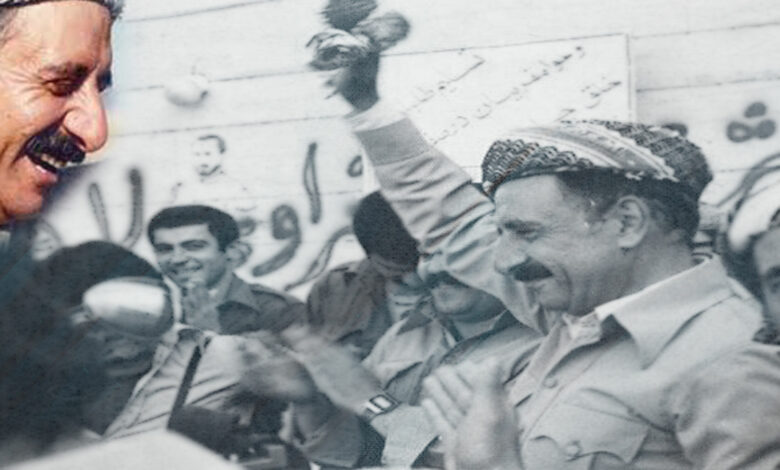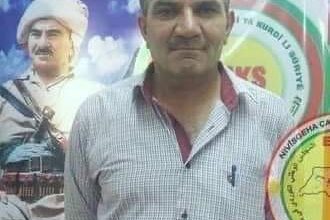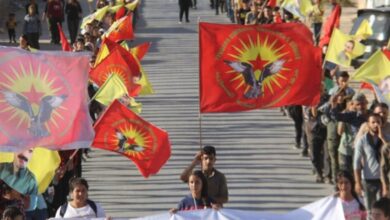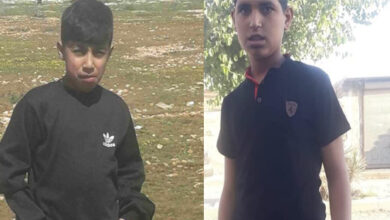
Hijri’s speech at the commemoration ceremony of the 30th anniversary of the assassination of Dr. Ghassemlou
On the evening of the 9th of July 2019, a ceremony was organized by PDKI in Brussels to commemorate the 30th anniversary of the assassination of Dr. A. R. Ghassemlou, one of the prominent Kurdish leaders and former General-Secretary of the PDKI, and his aid Abdullah Ghaderi-Azar. Both were victims of a premeditated assassination which occurred on the 13th of July, 1989. They were assassinated whilst attending negotiations between the PDKI and Iran to find a peaceful solution to the Kurdish question. At this ceremony the PDKI leader Mr. Hijri delivered the following speech, highlighting the Islamic Republic of Iran’s shameful record in using violence of various kinds to silence and target Iranian dissidents, opposition figures and Kurdish leaders at home and abroad, as well as Iran’s violent strategy of conquest and domination of the Middle East.
Ladies and gentlemen, honorable members of the European Parliament, dear friends,
Today marks the 30th anniversary of the assassination of Dr. A. R. Ghassemlou, former Secretary-General of the Democratic Party of Iranian Kurdistan, and his aides.
The assassination took place in Vienna on July 13, 1989. Dr. Ghassemlou and his aides were assassinated by the diplomats of the Islamic Republic of Iran.
Dr. Ghassemlou and the Kurdish delegation he headed had agreed to negotiate with the diplomats of the Islamic Republic in good faith to find a peaceful solution of the Kurdish issue in Iran. It is worth pointing out that the negotiations took place at the initiative of the Islamic Republic in the Austrian capital.
On behalf of my party, I would like to express my gratitude to you, honorable members of the European Parliament and our friends, for joining us in commemorating one of the greatest leaders of the Kurdish people, but also to condemn the state terrorism of the Islamic Republic of Iran.
As you know, the Islamic Republic of Iran has a shameful record in using violence of various kinds to silence and target Iranian dissidents, opposition figures and Kurdish leaders at home and abroad. The assassination of Dr. Ghassemlou in Vienna in 1989, as well as the assassination of Dr. Sadegh Sharafkandi in Berlin in 1992, another leader of our party, are testament to the fact that the Islamist regime in Iran, which is ideologically hostile to the civilized norms of the modern international order, uses terrorism as an indispensable element of its strategy.
Countless Iranian dissidents and opposition figures have been assassinated by the regime during the past forty years. In this regard, I would like to draw your attention to a report by Iran Human Rights Documentation Center, which is a non-profit organization based in the United States. The report, entitled ‘No Safe Haven: Iran’s Global Assassination Campaign’, was released in 2011 and contains the following key finding:
“Since 1979, the senior leadership of the Islamic Republic of Iran has been linked to at least 162 extrajudicial killings of the regime’s political opponents in 19 different countries around the world. These operations flourished in contravention of both international and national legal regimes, and were planned at the highest levels of state. Many of those responsible are still in power today.”
Ladies and gentlemen, as recent years terrorist plots and assassination attempts in the Hague, Paris and Copenhagen indicate, the Iranian regime continues to use terrorism and assassination as integral elements of its strategy.
In fact, the regime cannot even tolerate some of its most senior and loyal figures. For example, dissident Grand Ayatollah Montazari, the designated successor of Ayatollah Khomeini, was in house arrest from 1997 until his death in 2009. Presidential candidates Karobi and Mosvai have been in house arrest since the 2009 popular uprising against the regime.
Ladies and gentlemen, it is also important to consider the fact that terrorism is only one of the elements of the regime’s strategy to impose its Islamist ideology at home, as well as to dominate the Middle East. The other elements of the regime’s strategy include, but are not limited to, destabilizing neighboring countries, creating militias and funding various terrorist groups in order to undermine peace and security in the Middle East.
Iran’s violent strategy of conquest and domination of the Middle East is evident in Iraq, Yemen, Syria, Lebanon, and Afghanistan. What is less evident is the link between the Islamic Republic’s violations of human rights at home, including its global assassination campaign, and its foreign policy conduct in the Middle East.
It is high time for the European Union and the United States, two important global actors committed to human rights and lasting peace and stability, to consider the fact that the Iranian regime’s internal and external policies are linked and cannot be separated. Western policy has aimed at changing the “behavior” of the Iranian regime. This has almost exclusively aimed at the Iranian regime’s external behavior.
For example, it seems to be current EU policy to separate the nuclear issue from the broader and interconnected internal and external problems emanating from the Islamic Republic. However, systematic human rights violations at home, the quest for nuclear weapons, support for various terrorist groups, interference in the internal affairs of other countries, destabilization of important parts of the Middle East and so on are interconnected and need to be addressed as such.
This reality calls for a different Western policy. If the Iranian regime’s behavior is to change strategically, we need a normal government in Iran that is committed to human rights and democracy at home, while adhering to the norms of the modern international order. A government that is committed to human rights and democracy is a precondition for normal international conduct on the part of the Iranian state.
The Iranian regime may negotiate with the West when it is weak or when it serves its interests; however, four decades of experience indicate that any concessions the regime makes are tactical and temporary. The regime is also adept at deception, which it religiously justifies by invoking “taqia”.
Ladies and gentlemen, we also need to address the myth of “reform” in Iran. While there are different factions within the regime, the fact is that they are all committed to continued Islamist rule at home and domination of the Middle East, including the nuclear program. The so-called reformists’ priority is the preservation of the Islamic Republic rather than reforming or changing the regime. They play a useful role for the regime in mobilizing Iranian voters and upholding the West’s hope in internal reform. Yet, although the regime’s self-styled reformists have spoken about reform since the mid-1990s, no clear manifesto of reform was ever presented by them, nor has any reforms of constitutional nature been proposed, let alone implemented.
We are highlighting these facts based on four decades of experience in dealing with the Islamist regime in Iran. We hope that Western policymakers come to the same realization that peace and stability in the Middle East depend on the democratization of Iran. It was for this vision, for the realization of liberty and democracy, that Dr. Ghassemlou and countless others struggled and sacrificed their lives. Their struggle continues in spite of the brutality of the Iranian regime.
However, the struggle for liberty and democracy in Iran need Western support. It goes without saying that neither the Iranian population’s legitimate aspiration for liberty and democracy, nor the West’s interest in regional peace and stability can be realized without a democratic government in Iran.
Dr. Ghassemlou was a visionary leader. He was a firm believer in liberty, democracy, gender equality and the human dignity of the Kurdish people and other oppressed nations. Having lived and worked in Europe for decades, Dr. Ghassemlou was shaped by Western politics and culture, always preferring dialogue and peace. By assassinating Dr. Ghassemlou at the negotiating table, the Iranian regime demonstrated its true and violent nature.
Although thirty years have passed since Dr. Ghassemlou was assassinated, his legacy is enduring. Today, millions of Kurds, including our party, are committed to his ideals and determined to carrying on his struggle.
Thank you for your patience!
PDKI




